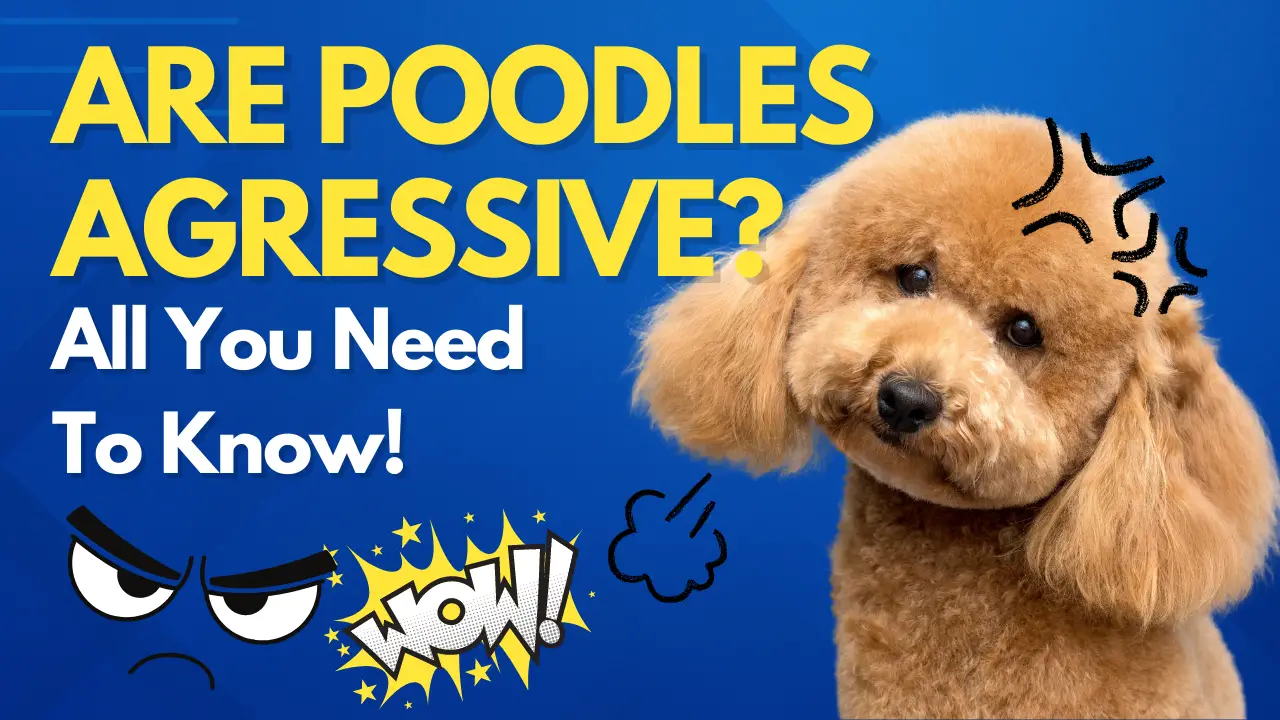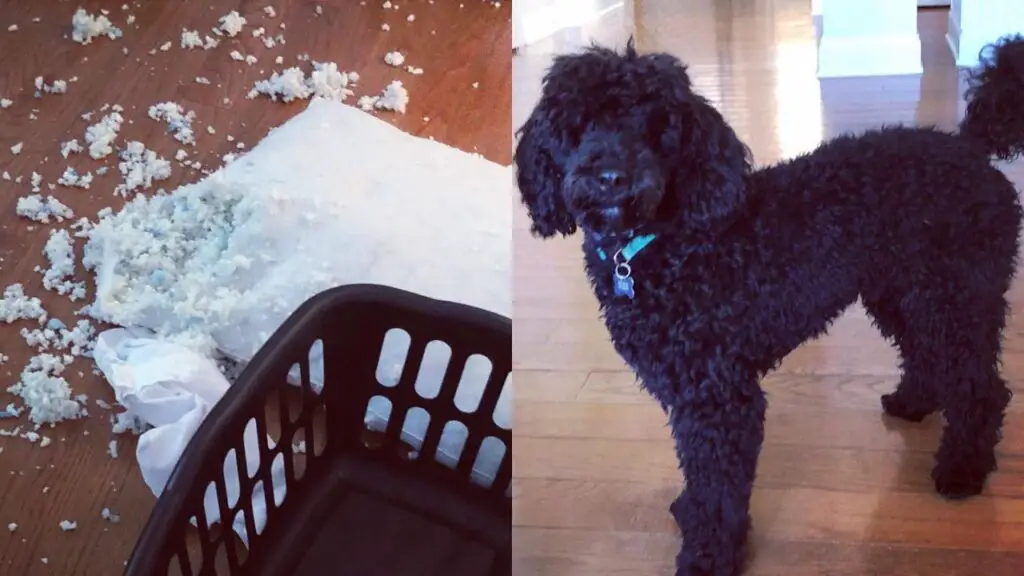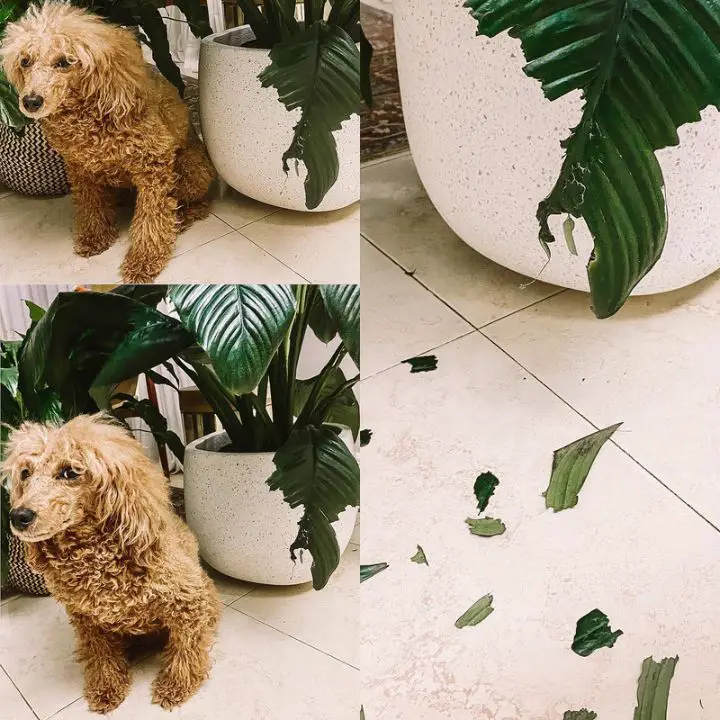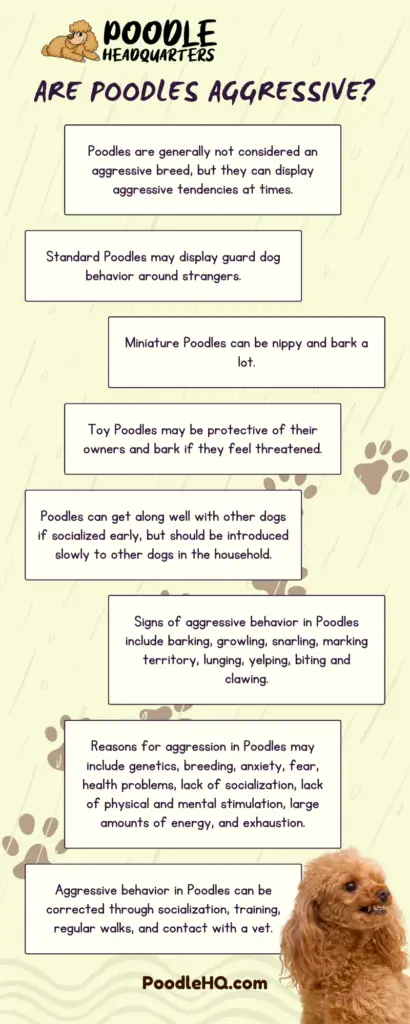What are the main factors you look into when buying a dog? No doubt, one of the main things you look for in a dog’s temperament. If you’re like me, you could be looking for a dog that’s gentle, friendly, and full of love.

The last thing you will want is an aggressive canine that could be unwelcome to friends and family.
What Will You Learn? 👇
Are poodles aggressive?
When you think of Poodle’s, you probably envision a bouncy and genial dog. This stereotype is still pretty accurate to a Poodle’s natural qualities. They’re not really an aggressive breed to own, irrespective of the type of Poodle you have. However, just because they’re quite nice does not mean they don’t show aggressive tendencies from time to time.

Read our Smart Poodles - Smart Tricks eBook for only $2.99
Dive into a treasure trove of engaging tricks and tips designed specifically for your poodle!
Are Standard Poodles aggressive?
Sometimes when looking at large breeds, we automatically feel they could be aggressive or threatening. Even though it’s the biggest Poodle, the Standard is not aggressive at all! On the odd occasion, it may display guard dog mannerisms, that’s if you have a stranger coming into your house. However, after a few minutes, it will resort to being calm and at ease. This type of Poodle tends to be peaceful, reserved and accepting.
Are Miniature aggressive?
Yes, miniature poodles can be aggressive. They are a small breed, but they have a lot of energy and can be very nippy. They are also known to bark a lot.
Are Toy Poodles aggressive?
No, toy poodles are not aggressive. They are small dogs, and are therefore not considered a threat by most people. However, they can be protective of their owners and may bark if they feel threatened.
If you’re planning on getting one of these types of Poodles, then you should have caution about who’s playing with them. Most of the time, these are friendly, happy-go-lucky dogs. But, if they’re teased or handled wrong, they can have fear-based aggression because of their small size. Therefore if you want to get one of these dogs and have children around, make sure you supervise them during every playtime.
Are poodles aggressive to other dogs
Poodles are renowned for their intelligence, quick learning, and adaptation skills. So as long as they’re socialized early, they should be pretty easy to own if you have other dogs.
In particular, Poodles go well with Cocker Spaniel’s, English foxhounds, Great Danes, St Bernards, and Basset Hounds. If you plan to bring a Poodle into your home and already have another dog, or vice versa, you will want to introduce them slowly to each other.
Signs of aggressive behavior in poodles
To know your Poodle is feeling at ease, you must be familiar with their aggressive tendencies. These aggressive tendencies could be:
Barking
It’s not unusual for Poodle’s to bark; after all, many dogs do this to communicate with each other. However, if you notice your Poodle constantly barking at someone or something, it might be a sign they’re feeling threatened.
Often when dogs do this, they are telling someone to stay away. In this instance, a Poodle might bark and not do anything else until the person or object is removed from the situation, so they don’t feel threatened anymore. However, be warned, if you ignore this consistent barking, there could be a chance your Poodle becomes more aggressive.
Growling
You should never ignore a Poodle when they start to growl. This is a significant warning from them which shows they’re feeling incredibly threatened or in danger. Usually, a growl is a low and deep noise coming from their throat. It can sometimes sound like a low-pitched, rusty howl. They usually could growl at people, animals, or objects. If you notice a Poodle growling and there’s nothing obvious insight, something could have disturbed their scent, making them feel in danger.
Snarling

Snarling has similar parallels to growling, and it involves your Poodles teeth to be shown. If you notice a Poodle snarling, then you need to leave and remove any other animals or humans in their way. Ideally, you will want to safely remove a Poodle as they could be very close to attacking. Plus, whoever is on the receiving side could get a serious injury, and you don’t want that!
Territory marking
When threatened, a Poodle may want to show its dominant side. You might find a male Poodle constantly lifting their leg and peeing on certain objects or areas. This can be quite a common behavior if a new dog, animal, or human enters your home.
Lunging
Lunging is an aggressive tendency a Poodle uses to show it’s prepared for a fight. This is a warning sign displayed from your Poodle when excited or in an uncertain situation. Sometimes they can do this around other dogs, too, if they’re not socialized.
Yelping
Sometimes a Poodle might make sharp noises as if they’re in pain. This could occur if there’s loud music around, new animals, or anything else. The reason they’re doing this is that they’re trying to fight but don’t know how, so they make a yelping/pain-like sound. In these instances, you should always look at the situation, and if you can’t find anything wrong, you should take them to a vet for an internal checkup.
Biting and clawing
As a dog owner, you should know that biting or clawing is the worst part of aggression a Poodle can display. By this point, a dog is highly provoked, and it can be very dangerous for the receiving person or animal. Poodle’s hardly ever bite most of the time, and they’re more likely to claw, but out of excitement.
Reasons behind the poodles aggression
While aggression is pretty unusual in Poodles, they can sometimes become aggressive due to the following:
Genetics
In comparison to other dogs, some breeds are naturally born aggressive. This is a big indicator of why some species are good with families, and others are better for hunting purposes. Poodle’s hunting genetics can inherit a bit of aggression, especially if they’re not socialized early. However, if you train them properly and introduce them to social situations early, their genetics should not be a problem.
Breeding
Depending on how a Poodle has been raised can influence how aggressive they can be. First of all, if you remove them from their mother before weaning and under eight weeks old, they could have aggressive mannerisms.
This is because they could lack naturally taught skills.
Plus, if their breeder raised them in an abusive environment or came from a neglected environment like a puppy mill, they could easily get angry.
Anxiety
If you leave your Poodle at home for long periods, they could develop separation anxiety. When dogs get separation anxiety, they’re more likely to bark, lunge, and engage in boredom behaviors like biting and chewing.

Fear
If a Poodle lives in an environment where they constantly feel worried or scared, they can become aggressive. For example, if you live in a noisy area with lots of construction around, fireworks or bars, the external noise can induce fear in a Poodle. As a result, a Poodle can develop aggressive behaviors that become consistent, making it difficult for them to be trained. Plus, if they’re made to fight with other dogs, aggression may be their only tactic to stay alive.
Health problems
Dog’s aren’t as lucky as us; they can’t communicate when they’re feeling unwell. If a Poodle has an underlying health problem, they could start showing aggressive symptoms like snipping, clawing, or whining, signifying they’re sick. This could result from a range of reasons, from sleeping less, eating less, being less active, or anything else.
Lack of socialization
If a Poodle is uncomfortable or displays aggressive behaviors around other dogs, then it’s most likely they’re unsocialized. Plus if a Poodle is lunging, barking, growling, or acting aggressively towards a dog every time, this is an obvious sign they’re uncomfortable. Instead, Poodles should be excited and curious when it comes to meeting other animals. To remove this, you should implement socialization training.
Lack of physical and mental stimulation
Poodles are highly intelligent animals that must have adequate mental and physical exercise every day. They should not be left on their own for long periods, confined to one room, or chained up. If this happens regularly, then a Poodle could become aggressive and unpredictable.

Large amounts of energy
If a Poodle’s energy needs are not met, it could become easily aggressive. Typical examples of this are pulling on a leash, growling at strangers, and being difficult to control. This is because if their energy is not expelled, they can become agitated and frustrated.
Exhaustion
Like us human beings, sleep is important for a Poodle, and if they’re exhausted, they could become aggressive. Sometimes when tired, they could act in abnormal ways like yelping or sniping. So make sure you give a Poodle a comfortable bed and plenty of rest periods.
The danger of an aggressive poodle
If you have an aggressive Poodle, there are two main dangers you could face, which are:
Physical
The aggression could be severe, whether it’s you, another human, dog, or animal on the receiving end. Dog bites or scratches can be fatal, causing a risk of infections, injuries, and diseases.
Mental
Aggression can have a knock-on effect on other mental behaviors in a Poodle. First of all, aggression is a common sign of stress that can trigger anxiety and sleeping difficulties. Lack of sleep in dogs can weaken their immune system, increase their risk of infections, and more.
How to correct aggressive behavior in poodles?
It’s never too late to train an aggressive Poodle; there’s a lot of things you can do to prevent or control their aggression which are:
Socialization
Ok, this is one of the most important things you can do for a Poodle from a young age. When a Poodle is a puppy, you will gradually expose them to other animals and humans. Similarly, when they’re an adult, you will also want to do this, so they stay used to others around them. This can also be achieved through the following:
- Doggy daycare: This is a place where a Poodle can have playdates with other animals while supervised. They’re beneficial for you as your dog can be looked after when you’re at work or busy.
- Regular walks: Walking a Poodle every day using different routes will allow them to become exposed and comfortable to different animals, humans, objects, and environments. Over time, they will become conditioned to associate strange situations with positive experiences.
- Favorite activities: When a Poodle is exposed to new people or animals, get them to play a favorite activity like fetch or frisbee. Over time, a Poodle will associate new people or animals with fun, not feeling threatened.
Training
You should conduct behavioral, obedience, and distraction training from an early age. If you have an adult Poodle, you should take them to a dog trainer and ensure their training is consistent. These types of training will teach a Poodle to be alert, calm, and switch their focus in difficult situations.
Morning and evening walks.
Try setting your alarm clock that little bit earlier in the morning, and go for a walk with your Poodle. That early morning walk can help stimulate them and keep them alert, releasing energy at the start of the day. Similarly, an evening walk can help tire them out before bed, stopping them from snapping.
Guests over
Now and then, have people or animals come over to your home while your dog is there. Doing this will allow them to become familiar with strange people in their own territory and socialize simultaneously.
Contact your vet
If you try all of the above and still are unsuccessful, you should speak to your veterinarian. In this situation, you will want to give your vet specific information on how they’re behaving and describe certain situations. In this matter, it’s important you listen to your vet and apply the advice they give. It would help if you also asked them what to do in the future regarding their aggressive behavior and the appropriate solutions to put in place.

Conclusion
Most of the time, Poodle’s are not an aggressive breed to own. It’s more likely a Poodle will have aggressive tendencies if they’re a Miniature or Toy Poodle. This is because these dogs are small, and if they’re mishandled or teased, they can snap or bite.
Plus, if a Poodle is left for long periods on their own, unsocialized or neglected, they could easily have aggression. To stop this from happening, you should socialize them regularly, exercise them and give them the affection they deserve.
Have you met an aggressive Poodle? Let us know in the comments down below.
Marko is the founder and author at PoodleHQ, where he blends profound expertise with formal training in Animal Behavior and Canine Genetics. With multiple generations of poodles under his care, he’s a breed connoisseur, honored with the Canine Care Excellence Award and lauded by the International Pet Enthusiasts Association.


We have a 2 year male toy poodle who has become aggressive over the last 6-8 months with growling and snarling. We do notice it’s more when he’s tired so after reading this, we just agreed as a family to leave him alone, not to even touch him. We do give him plenty of attention and exercise. Glad I found your article. Thank you
Hi Roxanne. I’m so glad you found the article helpful. Please let me know of the progress you’ll have with your toy poodle and if any of the techniques helped.
Hi, I have a 3.5 month old red male toy poodle puppy. Ever since we got him at 10 weeks we have had some handling problems. For example he doesn’t like having his mouth touched, he may growl, snap or bite if we touch his mouth or try to open it (for handling exercises). He also sometimes growls, snaps if we move him when he is lying down. He displayed timidity with new people so we began socializing him and taking him to puppy classes. We took him to a vet and the vet immediately grabbed his mouth to open it and check his ears and the puppy became very angry and growled, snapped. The vet in no plain terms told us we should return the puppy, puppies shouldn’t behave this way, it’s “1 out of 100”. Then he had us put the upset puppy on his back so he could check his belly, etc while the puppy was clearly scared and growling in fear. We already are working with a trainer and unfortunately felt our issue with aggression wasn’t taken seriously by her until the vet, she’s all positive reinforcement and said “just don’t do the things he doesn’t like”. I know I’m supposed to have people handle him to desensitize him but he isn’t comfortable with it, he lets people pet him and hold him with coaxing, slow moves, treats, etc. but not handling like where they can just touch him wherever to desensitize him everywhere.
The other day we went to a pet store and a trainer who worked there went to pet him, he snapped and went crazy and she simply held her hand near him until he stopped. Then she was able to pet him. He didn’t actually bite her. She thinks it’s important not to move your hand away or it reinforces that behavior.
He also was just groomed professionally and the groomer said he was snappy at the mouth but totally fine with ears, nails and she would groom him again.
I think he may not have been handled enough at the breeder and some of this is fear driven or anxiety, but some of the behavior with us his owners doesn’t seem to be fear driven at all.
Any thoughts?
Hi Lee.
Your puppy is displaying some fear-based behavior and it’s important to address this as soon as possible. It’s important to understand that your puppy’s behavior is a result of how he has been treated in the past, and it’s not his fault that he is behaving this way. You need to be patient, consistent, and calm when working with your puppy. It’s important to use positive reinforcement techniques and to never use physical force or punishment. Remember, it’s not about dominating the dog, but about building trust and respect.
The key is to desensitize your puppy to being handled, starting with small steps and gradually building up. You should work with a professional trainer who can guide you through the process. It’s important to remember to always reward your puppy for good behavior and to never react negatively to bad behavior.
The trainer you met at the pet store is correct, it’s important to not move your hand away from the dog, as it reinforces the behavior. You should also consider working with a professional groomer who has experience working with dogs who display fear-based behavior, like your puppy.